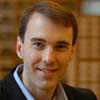 An Interview with Michael Lindsay
An Interview with Michael Lindsay
By Timothy Dalrymple
D. Michael Lindsay is a sociologist who specializes in issues of leadership, religion, and culture. His Faith in the Halls of Power: How Evangelicals Joined the American Elite was praised in academic and non-academic circles, and nominated for a Pulitzer Prize. He holds graduate degrees from Princeton Seminary, Oxford, and Princeton University, and at the World Congress of Sociology in 2006 he was honored as the most promising sociologist under 35.
Dr Lindsay is currently engaged in the White House Fellows Project, the most extensive survey of American leaders in nearly forty years. He teaches at Rice University, and is the associate director of the Center on Race, Religion and Urban Life.
For Patheos' series on the Future of Evangelicalism, he spoke by phone with Timothy Dalrymple.
You're in the midst of an amazingly extensive study of Americans in positions of leadership. What new trends have you seen amongst evangelicals that you did not discuss in Faith in the Halls of Power?
Probably it is the changing attitudes that evangelicals have toward the potential of building major institutions and supporting existing institutions. There's a real entrepreneurial spirit within American evangelicalism, which you can trace back to the moral crusades evangelicals that have been a part of throughout American history. But that entrepreneurial spirit tends to be averse to a lot of new enterprises, new organizations, new institutions. While there is still that entrepreneurial energy, a lot of it is being directed toward transforming existing institutions, or to building up or pulling energy into existing conduits of influence.
For example, evangelicals are becoming much more engaged in the foreign policy establishment, such as the Council on Foreign Relations, the United States Agency for International Development, and even the State Department. These were institutions that for decades evangelicals were very wary of, very skeptical about being involved with, and yet today evangelicals are key players within them.
Indeed, look at the influence of one individual, Michael Gerson; he has been able to generate a great deal of interest within the foreign policy community in how evangelicals can be concerned about issues of relief and development abroad, and how that in turn can mobilize a constituency that was once not very engaged in foreign policy issues. Now evangelicals are largely considered to be the foreign policy conscience of American political conservatives.
This focus on the institution is directing a lot of energy toward things that have been around for a long time. There have always been evangelicals at Harvard, there have always been evangelicals in Hollywood, but I find that they are much more willing now to give up their money, time, and energy to these major institutions in American public life in ways that we have not seen amongst evangelicals, say, in the 1950s and 1960s.
When I was an undergraduate student at Stanford, a charismatic pastor who was passing through the area gave a talk to the evangelical students. He described standing in Harvard Yard and sensing a greater spiritual darkness than he had ever experienced before. That kind of oppositional attitude, in which evangelicals are in a pitched spiritual battle against major American cultural institutions -- do you see that changing? Is there still an "infiltrate and conquer" attitude, or is there a more participatory and engaging attitude among evangelicals now?
This is probably where we're seeing the biggest shift. There still remains an infiltration mindset among some evangelicals. The rhetoric of being a stealth Christian in Hollywood or in higher education remains an effective rhetoric for fundraising and mobilizing. What I am finding, though, is that it's far less prominent than it was in recent decades, because frankly there are more evangelicals in these gate-keeping institutions.





